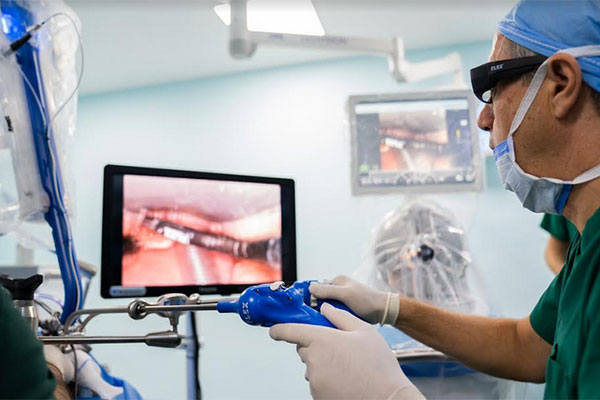
Dubai hospital deploys robot tech in two surgeries
DUBAI, November 24, 2019
The UAE’s Ministry of Health and Prevention (MoHAP) said that the medical team at Al-Kuwait Hospital, Dubai, recently performed two surgeries using advanced surgical robot technology.
The first operation was for a patient with malignant cells in the larynx, while the second one was for a patient with sleep apnea due to enlarged tongue.
The ENT department of Al Kuwait Hospital has developed a treatment plan for the Laryngeal cancer case and prepared the patient for the surgery after necessary medical examinations have conducted.
The surgery was performed using the latest generation of robots in the Middle East, supported by the competency and expertise of the medical staff to perform such sensitive surgeries, in which a lot of challenges are faced.
Until now, making an incision (cut) on the front of the neck and opening a patient’s larynx were required in such operations, the matter which has dangerous consequences.
While the surgical robot makes it possible to perform the surgery in a better way by removing the tumour through the mouth without having any negative effects on the patient’s speech or swallowing.
Also, the surgical robot is characterized by shorter periods of recovery, less pain, reduced amounts of painkillers, a smaller wound, and a cosmetic preference, shorter hospital stay, faster return to normal daily activities, reduced need for blood transfusion, risk of infection, and fewer complications.
Dr Youssif Al Serkal, Assistant Undersecretary for the Ministry’s Hospitals Sector, said: “We have a strategy for bringing more surgical robots in the coming stage and providing the medical teams with the necessary training for using them.”
Dr Ahmed Al Emadi, deputy medical director and head of ENT Department, who performed the surgeries with the support of the visiting surgeon Dr. Michelle Barbara, who has extensive experience in robotic surgery, said that the robotic arms enabled them to perform precise surgeries without fibrillation, as in conventional surgery.
He added that this significantly reduced the negative effects of surgery, noting that both patients left the hospital a few days after surgery.
Dr Al Emadi said: “This type of surgical robot, compared to other conventional robots, is characterized by its small size and ease of transport to the operating rooms, where the surgeon controls and manages the robot from the operating room itself and not remotely.
“It’s also marked by its ability to reach small parts and narrow places of the human body by mouth to perform the required surgery, while it is difficult to access through conventional surgery or require an external surgical incision to reach them, including deep parts of the throat and upper part of the trachea.” – TradeArabia News Service







